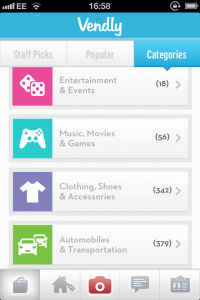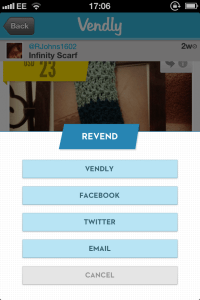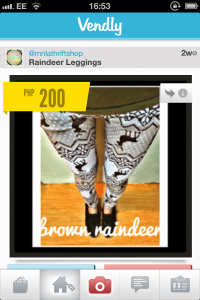Chilean startup Vendly, backed by a $200,000 seed from UDD Ventures – and now relocated to San Francisco and looking to raise a Series A this spring – wants to cash in on mobile by turning your smartphone into a free mobile marketplace. The Vendly iPhone app lets you sell (aka 'vend') items; impulse buy from your friends (or strangers); and help others sell their items by 'revending' (think retweeting) their item on your profile so that all your friends/followers get to see it, too.
Why should you revend an item? Not just because you're a nice person, of course. If your revend results in a successful sale you'll get a commission for your help — or that's the theory. The current version of the app does not incorporate the payment process but instead opens up an IM chat between buyer and seller so they can resolve how to pay between themselves. But the next version of the app will have payment baked in so Vendly can track and ensure commissions are paid. "The idea is to liberate the payments once the transaction is closed and approved by the parties (just like in Airbnb)," says co-founder and CEO Alan Strauss.
Vendly is free for sellers to list and sell items on the marketplace, which sets it apart from auction sites such as eBay that generally charge sellers to list and take a cut of any sale. But Vendly's social component is its key differentiator, according to Strauss. The app wants you to find and follow existing friends to create a trusted network to sell to and buy from — letting you link Vendly with your Facebook account, or invite friends and contacts via email to help build this circle.
Strauss says that Vendly's founders — the two other co-founders are Alan Nudman, CMO, and Andres Gottlieb, CTO — saw an opportunity to create a dedicated social e-commerce app after being tagged in items their friends were selling on Facebook.
"We know each other from high school but around a year ago we reunited and start discussing about how irritating it was that people tagged you in Facebook to sell their products. This is how we realized that e-commerce hasn't been able to adapt to the people's needs to sell and buy products," explains Strauss. "This is why we decided to create Vendly as an instrument to allow users to buy and sell through an app specially designed for these purposes. The latter in an easy, safe, non-friction, mobile and fast way, allowing users to monetize their network by revending any product they find to their own network, earning commissions for their help."
The clean, uncluttered Pinterest-esque Vendly interface is clearly designed for the small screen and includes mobile-specific features such as the option to shake the phone to view a random item for sale, and all viewed items automatically saved in a timeline for easily flicking back through later. Listing an item is also quick and easy to do on a phone: a case of snapping a photo with your camera phone, adding a price, title, description and one of the 10 categories and hitting submit. The app also lets you cross-post to Facebook and Twitter for maximum exposure via the interface.
 Vendly users have mini profiles, listing how many items they have bought, revended and sold, plus how many followers/followings they have — with the idea being for buyers and sellers to establish whether they think another user is trustworthy based on who they know and how they interact. There is also a Vendly website — inevitably named Vend.ly – but it's for browsing and revending only. If you want to sell stuff you have to get our your smartphone.
Vendly users have mini profiles, listing how many items they have bought, revended and sold, plus how many followers/followings they have — with the idea being for buyers and sellers to establish whether they think another user is trustworthy based on who they know and how they interact. There is also a Vendly website — inevitably named Vend.ly – but it's for browsing and revending only. If you want to sell stuff you have to get our your smartphone.
There's no doubt that people are getting increasingly comfortable with tapping 'buy' on their phones, and that's the trend Vendly is aiming to surf. Mobile shopping grew by around a fifth (YoY) over the Thanksgiving holiday period last year, according to IBM Digital Analytics Benchmark. eBay and PayPal also reported record mobile sales during the holiday season. And late last year e-commerce site Fab said it was expecting around a third of its global sales to come from mobile, up around double on the year before. Consumers spent six times as much time using retailers' apps in December compared to a year earlier, according to mobile analytics company Flurry.
While buying from individuals is not the same as buying from a brand with a trusted reputation, buying from friends or at least people within your social circle is a step closer to that trusted scenario. Since Vendly launched on the App Store two months ago — and without doing any marketing at all, according to Strauss — they have accrued 5,000 users (a rate he says is doubling each month) with 3,000 published products for sale. "We are starting to grow very fast," he says.
Despite this early growth, Vendly's service is still effectively in beta — with various features still being tested or yet to be properly rolled out, such as a proximity filter slider bar for the category search that lets users specify how 'local or global' the items they see for sale are, relative to their location. New versions of the app are being released every two weeks — but the aim is to have "the first robust version complete by the beginning of March," says Strauss.
Asked who he sees as Vendly's main competitors, Strauss says it incorporates elements of various other services — including Wanelo, Etsy and FAB – but he maintains its main competitors are social networks, such as Facebook and Twitter, which are being informally used to sell stuff. Since the big social networks aren't streamlined for e-commerce, Vendly reckons there is an opportunity to step into the social space with a dedicated app.
So where will Vendly's cut come in? Strauss says the startup has three revenue models in mind for monetizing its free mobile marketplace in the future. Namely: premium accounts for retailers/producers who "desire to have more control over their products, massively promote their vends and want to have a better professional experience (including analytics, insights and others)"; an affiliate model working with companies, such as Amazon, eBay and Groupon to display their products on Vendly, in exchange for a commission; and a "CPC injection model" that lets vendors promote products on users' timelines to reach more potential buyers.

No hay comentarios:
Publicar un comentario